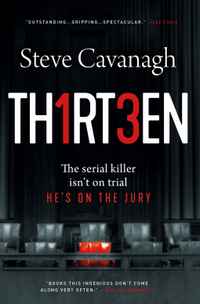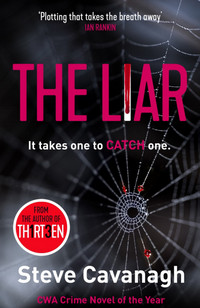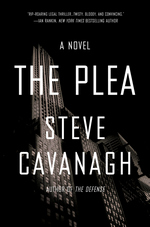 Thirteen
Thirteen
by Steve Cavanagh
Series: Eddie Flynn, #4
eARC, 336 pg.
Flatiron Books, 2019
Read: July 26 – 29, 2019

I wanted this posted a day ago, but just a couple hours after finishing it, I wasn’t capable of discussing it in a meaningful way—unless you consider gibberish with intermittent “squee”s and a lot of exclamation points meaningful (and, I suppose it is, in a fashion). I think I’m a bit better now, but I’m still having a hard time organizing my thoughts. I’ve discussed each of the prior Eddie Flynn books in the last couple of years here—and each one has been a little better than its predecessor. This is no exception—but I’m not sure if Eddie Flynn #5 will be able to top this one (equalling it will prove difficult enough).
But I’m getting ahead of myself.
Before he’s had time to fully absorb—much less react to—some devastating personal news, Eddie Flynn is approached by one of the biggest, flashiest, best-known defense attorneys in New York to be his second chair in an upcoming murder trial. He’s not interested, at all—even after the money on the table is mentioned. But he eventually agrees to meet with the accused to decide if he believes in the client’s claims of innocence.
Robert (Bobby) Solomon is an actor on the verge of super-stardom. He’s one-half of a Hollywood power-couple with a reality show and a couple of movies together that are responsible for this status. He also stands accused of killing his wife and their security chief after finding them in bed. Eddie believes him and signs on. The media (social and otherwise) is abuzz with the killings and is circulating plenty of rumors, innuendoes and speculation about Bobby and his wife at this time, as they cover “The Trial of the Century.”
The prosecution’s case is almost overwhelmingly strong, but with some creative thinking, Eddie and his investigator dive into the case, coming up with a strategy for his defense—including ways to attack the prosecution’s case. His investigator is the FBI Agent Harper from The Liar, who has since quit the Bureau and is doing PI and security work with her former partner (this was a great move by Cavanagh, she’s the best character from that book not named Flynn).
Still, that’s a daunting target and an almost impossible feat. But what makes it worse? The actual killer—a serial killer, mind you—is on the jury and is committed to getting a guilty verdict. What a great hook, right?
It is hard, almost impossible, to give readers a serial killer as unique as this one. He’s not as charming or intelligent as Dr. Lecter (but close on the latter), he’s not as obviously sick and twisted as most fictional serial killers. There’s not a trace of sexual sadism or anything like that to his modus operandi (which is not to say there’s none in his past). He’s smart, he’s careful, he’s strategic and committed to his vision. He’s got some natural gifts that help him—and an ally that assists him (a non-lone wolf serial killer, I don’t know if I’ve seen that before).
What separates this killer from the rest is the motivation behind his killings and victim selection (and how he makes them a victim). Yes, he’s clearly mentally ill—psychopathic/sociopathic tendencies (if he’s not diagnosable with either), and he enjoys his work. But there’s an ethos, an ideology behind his work. He’s got a message for the world, a lesson he’s trying to teach people. Everything he does is toward this goal, toward living out this ethos. I absolutely loved this, and the more Cavanagh showed this was behind the killing (and eventually, killings), the more we saw of the motivation, the more I liked it (and the more impressed I was with the creation of this killer).
I want to go on a few more paragraphs about him, but I can’t without spoiling everything—so let me stress this is a great, and unique, serial killer.
While dealing with this case, Eddie also has some family problems he’s trying to address, and there are some NYPD cops out for him after embarrassing a detective on the witness stand. Eddie spends more time in danger from members of the NYPD than he does from the killer.
Harry, of course, is back—which is great. He’s more involved in this case than he has been since the first book, The Defense. He’s a judge, Eddie’s former mentor and current self-appointed guardian of Eddie’s alcohol intake. He’s a great friend and ally for Eddie. We also see the return of Arnold Novoselic, the jury consultant that caused so much trouble for Eddie in The Defense, this time, however, he’s on Eddie’s side. From a one-dimensional bad guy in book 1, he’s transformed into someone Eddie has to—and then can—rely on. There’s a new prosecuting attorney, and he’s a great character and a worthy competitor for Eddie.
No matter who’s writing the legal thriller, one of my favorite parts of the book is the narrator/protagonist giving the reader insight into how the judicial system functions—the nitty-gritty stuff about scheduling trials, deciding who to put on your witness list, the order you call the witnesses in, and so on. The reader gets plenty of that here—along with two (complementary) explanations why attorneys on either side of the case just don’t want anything to drive a judge to sequester a jury. I’d never thought of that before, but it rings so true. Eddie also gives a very detailed explanation about how the skills that made him a successful con artist make him a successful trial lawyer. Because I enjoy it so much, I could’ve read a whole lot more of this “behind the scenes” material if it’d been possible for Cavanagh to work it in. Still, I think we get more of that here than we have before.
The pacing on this book is intense—Eddie being hired, investigating, the trial and the outcome all take place in a week. A business week, Monday – Friday, to be specific. That’s just insane—and improbable. But you don’t stop to doubt it while reading. Even after finishing the book, I can’t be bothered to spend too much time wondering about that, because Cavanagh sold the timeline so well. It doesn’t feel rushed at all, however, it just feels like an intense thriller.
While driving the pace that hard, no corners are cut in the intricacy of the story. There are surprises, twists and turns enough to satisfy every reader, and enough courtroom shenanigans to compete with Mason or Haller. The penultimate reveal got me calling Cavanagh some pretty terrible names—not because I didn’t like the reveal, not because Cavanagh cheated in the way he told the story, but because he fooled me. It was all there, ready to be seen, but like a good magician, Cavanagh kept my eyes on what he was doing with one hand and ignoring the —he totally hoodwinked me. I admire that in an author but despise myself for falling victim.
Is Thirteen a decent jumping-on point to the series? Oh yeah, a great one—but you might find yourself a bit underwhelmed if you then go on to read the previous books (just a bit, that that’s only in comparison to this). For those of us who’ve been with Eddie for a while? This is a noticeable progression in quality. Cavanagh’s no longer a promising new author, he’s a reliable established veteran. Cavanagh’s been accumulating plenty of awards lately, and Thirteen demonstrates why and absolutely deserves the critical and award attention it’s been receiving. But better than all of that? It’s a riveting and rewarding read—entertaining, tense, and satisfying. Go get yourself a copy now and you can thank me later.
Disclaimer: I received this eARC from Flatiron Books via NetGalley in exchange for this post — thanks to both for this.
—–

![]()








